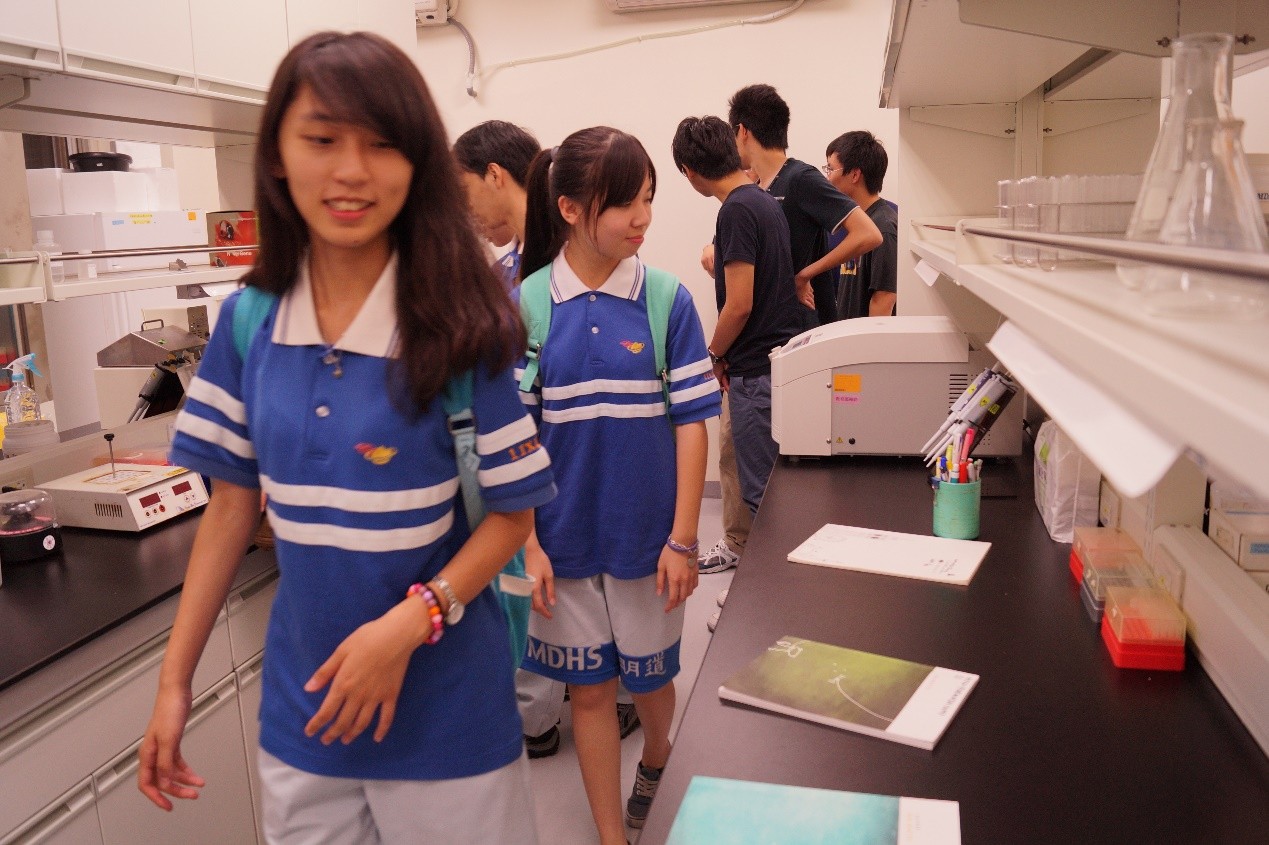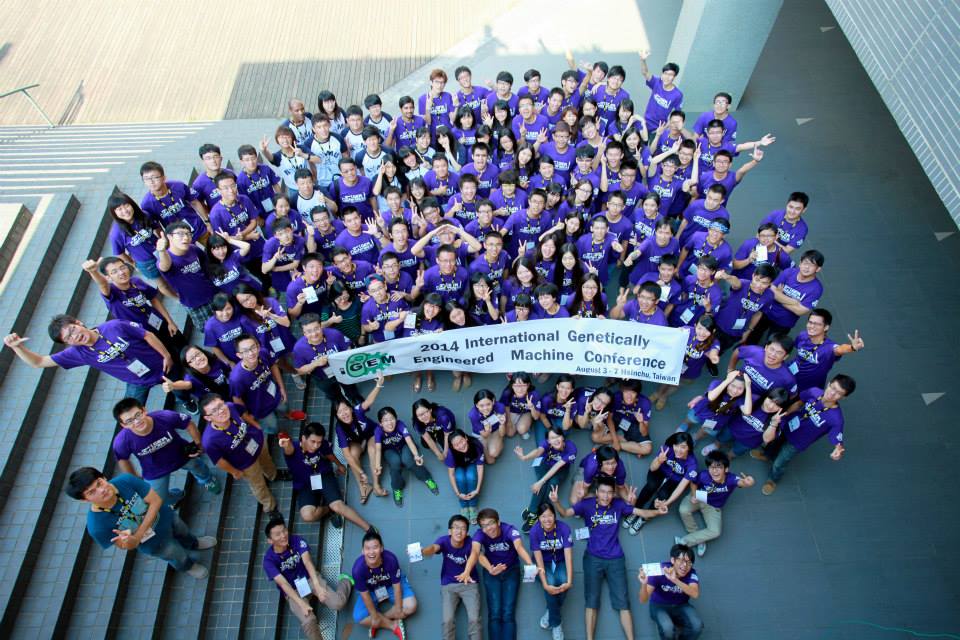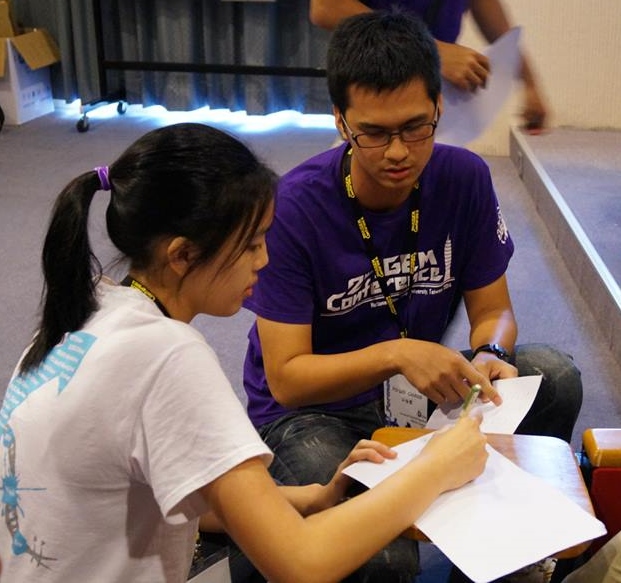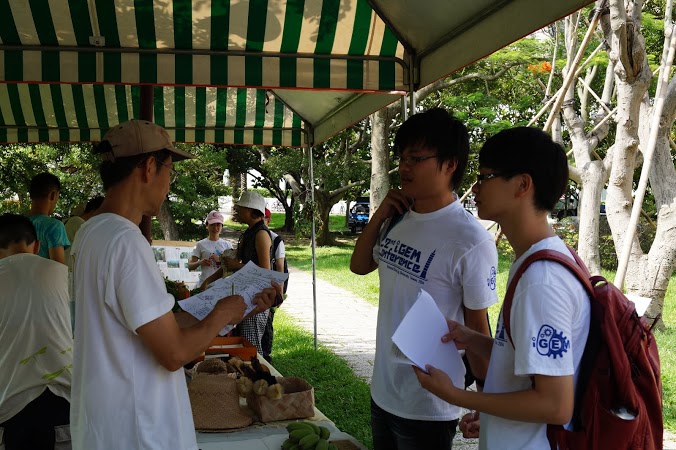Team:NCTU Formosa/human practice
From 2014.igem.org
- Field trip and Industry collaboration
- Teamexchange
- iGem exchange
-
Contents
Overview
In order to know more about insect, we went to the department of entomology and discussion about our project with Dr. Tzeng in NCHU. Dr. Tzeng gave us many useful suggestion and let us learn many knowledge of entomology. Furthermore, we went to the 18 park and Wang Lai farm to catch the insect for our experiment and test our device. It is really a special experience for us.
-
PBAN
There are so many iGEM teams all over the world. We are not just doing our own project but engage in the world of iGEM. We not only have a conference with the school in Taiwan but also have a video conference and an iGEM conference with about 20 teams from China. It is surely a good way to get some suggestions and make new friends by team exchange.
-
Brobrick
As an iGEMer, we want to let people know about the beauty of iGEM and synthesis biology. In this year, we introduce iGEM to the high school students in the Bio-camp this summer and we went to the green market in NTHU to interview the organic farmer in Taiwan. In addition, we made an introduction of our project and iGEM to the students from SNU, Korea. We hope that next year there would be a new iGEM team in SNU and we felt really happy when we got a good response from the professor of SNU.
Field trip and Industry collaboration
Cooperation with Sunnymorning Organic Farm
After NTHU Green Market-visition, we NCTU_Formosa succeeded in finding an organic farm, Sunnymorning who was willing to cooperate with us.
Sunnymorning orgnic farm is located on the boundary of Hsinchu and Miaoli in Taiwan, about 40 min. from NCTU by motorcycle. Because there are many kinds of crops in their farm, at night, there are hundreds of moths coming to face on opening the flashlight when summer comes, the farm master talked in amused way. Thus, they are very plagued by harmful insects problem. Because the organic farming method dosen’t allow using the pesticide which will harming the soil, they have used many kinds of methods to reduce the numbers of harmful insects in their farm.
They introduced many common insects-capturing tools to us, like: fly and insect catching adhesive tool: All-net, pheromone insects-capturing tools……,etc and also provided many treasured comments and advice about our project and device, which let us have deeper consideration to our future testing and the problem of the practicality of our device.
We are very appreciated to Sunnymorning organic farm who is willing to let us test our device at any time or area and helps us capturing our target female moths, which let us own enough number of female moths to test the basic effect of our PBAN in NCTU. This cooperation let us enjoy our project in capturing insects, and also we were happy to know the farmer’s enthusiasm about our project. Most importantly, this cooperation had made the most progress to our project!
NCHU-visitation
Dinning Together in Feng Wu
Experience Sharing of Capturing Bloodsucking Flies in the farm:
Dr. Tzeng told us the livestock farmers used to borrow the Insect light trap from them to capture the Bloodsucking Flies. To our surprise, he said the light trap can capture thousands of insects at just one night. Aditionally, they also had some cooperation program with livestock farmers. At that time, they used many different interesting approaches, like colors & light to test the behavior of Bloodsucking Flies. This experience sharing made us learn some basic methods of testing insects’ behavior.
The Art of Insect Rearing for Them:
Dr. Tzeng told us insect rearing is not only a branch of knowledge, but a kind of art. For example, when malaria was a pandemic disease all over the world, some related research had difficulty in obvious progression, because Anopheles gambiae had not been reared successfully at that time. However, since a researcher from United Kingdom had success in rearing Anopheles gambiae in lab, the malaria disease had been completely researched, and the health life of human had been improved. This concept raised a great inspiration for how to do the research of our project.
Suggestion of Our Harmful Insects--Bactrocera dorsalis:
Dr. Tzeng told us the bactrocera dorsalis is a serious problem for Taiwanese agriculture, which causes 17 billions dollors of loss every year. Our government had used many methods ( like:air drop many non-fertility bactrocera dorsalis to the farm ), trying to solve this problem, but finally failed. Dr. Tzeng suggested Bactrocera dorsalis as the target harmful insect of our project to solve the main problem of Taiwanese agricultural insects damage.
Discussion about Ecological Equilibrium Problem of Our Project:
As for the ecological equilibrium problem of our project, Dr. Tzeng thought foundamentally we human farm in the area, having caused harm to nature. If you persist in the ecological equilibrium problem, then you have to ask yourself why you do farming and cause harm to the environment?Dr. Tzeng gave us a special view point, highlighting in the beginning, we human who do farming to survive have caused harm to the environment, so we shouldn’t inspect the ecological equilibrium problem of capturing insects.
Experience Sharing of Dengue Fever Prevention and Control:
Dr. Tzeng shared the interesting experience of his presentation about Dengue Fever Prevention and Control at many town offices and also introduced there are two kinds of dengue fever vector mosquito, one is Aedes albopictus outdoors and the other is aedes aegypti indoors. We not only learned simple knowledge of dengue fever but also realized the feeling of helping people with professional knowledge.
Explanation of the Real Function of Mosquito PBAN:
In fact, the mosquito PBAN is activated during spreading wings when the mosquito emerges from its pupa. Initially, the mosquito wings are all living cells and when its PBAN regulates some hormones to make some cells apoptosis, just leaving few cells alive on its bone of wings, it finally forms transparent wings. This explanation about mosquito PBAN gave us a deeper realization about PBAN.
Take a Look at Their Mosquito Breeding Cage and Insect Light Trap :
Dr. Tzeng let us take a look at Culex pipiens molestus (the underground house mosquito) breeding cage, and also introduced the behavior of many kinds of mosquito. This mosquito breeding cage inspired us many new ideas about our insects testing box. In fact, we mimicked the same concept of mosquito breeding cage to test our PBAN effect simply.
Further Discussion about our project:
Dr. Tzeng have enthusiasm on discussing our project. To prevent any problem from happening, Dr. Tzeng and we inspected all the probability which may cause our project failed like PBAN degeadation in insects’ intestine ( whether we have to use little thuricide to cause some holes on insects’ intestine to make it absorb our PBAN easily ) and the restriction of our project ( we have to capture the first “female” insect in our device, and actually our project work. ). In the discussing process, we inspected many problems again, and also get many suggestion from Dr. Tzeng. We hoped we can overcome all the problems, and improve our project.
Advantages Discussion of Our Device:
Referring to our project, we use PBAN to make the harmful insects produce pheromone for us to help us attract many same kinds of insects. Dr. Tzeng was very interested in our project, and thought compared to the common use (Pheromone Trap & Pesticide ) in the market, our main idea have no dug resistance problem ( PBAN is insects’ physiologically natural substance ) and have no worry about the problem of running off our PBAN ( PBAN can be mass produced from our E.coli. ). It is a very user-friendly、eco-friendly and perfect project.
In briefly conclusion, our team and Dr. Tzeng had deep discussion in this visitation. Not only experience sharing but also project inspection made us learn much and got many new ideas which let us realize how to make use of our project to achieve the best effect.
18 Park & Wang Lai
In one night , our insect catcher went to the 18 park which nearby our school and wanted to use our device to catch the insect that we want to use them in our experience. We use several bottles which contain the sugar solution and use the bulb to attract the insect. Next day morning , we check our device which full with different kinds of insect and moth. The result is really inspired us.
In one summer night , our crazy insect catcher went to a farm which is far from our school because this farm has our target moth. We want to catch those moth to be our experiments. The farm owner not only provided us to catch the moth but also tell us how modern farm catch the moth. They use the blue to attract the insect and those insects came close to the device. Device has the little fan on it , so the moths close to the device would be sweep into the device. We will put those idea into our device make our device more efficient and more creative. After two hours , we catch many moth we want and learn more about how farmer catch the pest.
Team exchanges
MDHS-conference
We invited Mingdao High school iGEM team to exchange ideas with us. We also held a pizza party to enhance more fun in this event.
We asked Mingdao high school to give a brief introduction to their project-Odor Let It Die. It’s really an interesting and creative idea. Although they are just high school students, their English presenters clearly explained what problems they want to solve. In the discussion section, we gave them several feedback and suggestions to perfect their project.
As for our presenting section, we successfully caught their eyes with our creative project-Operation Debug, which is to attract pests in the farm with PBAN. After our amazing presentation, we believed they not only learned more knowledge about synthetic biology but also impressed by the future development potential of this field.
Because some high school students are pretty curious about our laboratory, so we guided them to pay a visit to lab at the end of this event. We introduce the equipment we usually use in the process of DNA synthesis.
Video conferencing with Xiamen University
We had a video conferencing with the iGEM team of Xiamen University, China, in May. As both teams just started their own research projects at that time, the main topics of this video conferencing only consisted of a brief description or introduction of the protocols for each other’s project, how the research team was established and organized. According to this short conferencing, we knew the Xiamen team mainly consists of sophomores or juniors, whereas they were surprised to learn that almost 90% of our team members are freshmen.
Conference
We hosted the 2nd iGEM Conference from August 3th to August 7th at the NCTU. More than 20 research teams were invited this year. Since this was the second time for us to host the Conference, how to make it better and more intriguing than the previous one had proved to be a great challenge and novel experience for all members of the NCTU_Formosa Team (2014).
Although we had encountered many problems at the beginning, we were extremely grateful that all the difficulties could be overcome with the assistance from our instructors and the team members of the NCTU_Formosa (2013).
We were more than delighted to see the iGEM 2014 turned out to be a wonderful and successful conference in that the whole meeting went smoothly, and more details and trivialities could be well taken care of throughout each individual section.
As a warm-up Asian Jamboree, the Conference set up a stage for each team to present their projects and posters for exchanging research ideas, sharing experiences, or acknowledging difficulties that all delegates have encountered.
We were not only grateful to acquire all the feedbacks and advices on our project, but were also deeply intrigued and impressed by the projects carried out by the other teams. Their endeavors and methods were indeed very inspiring that have helped us to generate more research ideas, and to raise the possibilities for collaborations with other teams.
In addition to the scientific sections, we also arranged several social events, including a welcome party, one-day trip in Taipei, and a roadside banquet as the farewell party. We believed the traditional Taiwanese cuisines and unique foods of night markets might be the most effective vehicle to make friends and strengthen our relationships with the delegates from abroad. Despite being exhausted in planning and hosting all these events, we hoped that all delegates felt entertained and welcomed.
Thanks to all the members of the iGEM, the Conference not only provided us with the opportunity to promote our project, but also created a valuable experience or ‘collective memory’ that may bind all iGEMers together in the forthcoming years.
iGEM advertising
Biocamp
In the summer, our department held a bio-camp. We spent a morning teaching them what synthetic biology is and introducing them to iGEM. In the beginning, I thought they might fall asleep during our lecture, but it was totally different than I thought. All of them were fascinated by the idea of using enzymes and different assemblies of biobricks to create new functions, and interacted enthusiastically with us. For high school students, it is hard to imagine how scientists transfer genes into bacteria and plants. So we used some easy ways to explain how we do those jobs and we also designed some games to help them learn the basics of biobrick assembly. After this class, I think they gained a deeper understanding of synthetic biology. Hopefully through letting them think that iGEM is cool, we inspired them to become future iGEMers or even synthetic biologists.
NTHU Green Market-visition
To further understand the real practicability of our device, we visited the Green Market in NTHU this summer. We had a good time interviewing with organic agriculture farmers. Through the interview we could assess the feasibility of future development of our project as well. What's more , We designed questionnaires for farmers in green market in NTHU . The questionnaires were to publicize how our device works , and we also learn from their advice.
<p></p>
Few weeks after the iGEM conference, some researchers of the Seoul National University came to visit us at the NCTU. We delivered a short presentation of our project and showed them our lab settings. As they have not yet established an iGEM team, they appeared intrigued by our demonstrations and were very keen to set up a team next year. Therefore, we made a further introduction of synthetic biology to them, and shared then with our experiences in establishing an iGEM team.
</div></div>
<p>
Even with the funding support by our school, iGEM is still an economically taxing project. With our many spendings on materials for our device developing and testing, we need to find sponsorship. We planned reach out to several corporations and propose our project. We went to our alumni association for contact information of alumni founded enterprises. Due to privacy concerns, we weren’t granted this information. However, our team member Rachel, who proposed to the alumni association and met with the CEO, was invited to an alumni dinner meeting. She was given a five minute timeslot onstage to explain the iGEM competition, the workings of our team, and how we need their support. This immediately drew the interest of the many successful entrepreneurs who graduated from NCTU. We successfully raised five hundred thousand NT dollars that night, right at the venue. We also received emails showing giving encouragement and support to our team from many alumni who went on to tell more alumni who weren’t present about iGEM and us. It is this spirit of always helping out one of our own that established NCTU’s excellence. We cannot be more thankful to their help. There are also several other corporations that we are still communicating with. The whole experience really allowed us to get in touch with the real world and society.
</p>
<p></p>
After we visited the green market, we know that pest plague is surely a big problem for them, especially for those who grow fruits and vegetables.
In the end, we came to few conclusions :
I. Analysis
After a whole day of investigation, we listed 4 main problems required to be solved before our device hits the market:
1. Cost
Pest traps are actually pretty low at price on the market, if we still use acrylic material, the entire device might not be as economical as we had predicted. Farmers suggested us switching to another kind of material such as PET or PP that are easier to acquire to make this device more competitive on the market.
2. Technical training
The working theory of our device is similar to that of pheromone trap, however, not every farmer has related experience. It’s necessary to simplify the steps to operate device.
3. Safety of genetically modified products
Although we are not growing GMO, some farmers still can’t hold a positive attitude toward our device since it’s relevant to gene modifying technique. So it’s not for sure whether our device would be accepted by the market in the future.
4. Efficiency
Wonderful as the idea may seem, our device still has to be more powerful than other pest traps on the market.
II. Achievements
One of the farmers indicated willingness to provide us with the targeted insects. Also many welcome us to test our device efficiency on their farmlands. For them, as long as our device doesn’t contain any hazard pesticide or harm the environment, our project would be another good choice for them to solve pest plague.
</p>
SNU-visit
<p></p>
Fund raising
Futurework
Surveys
 "
"


















































